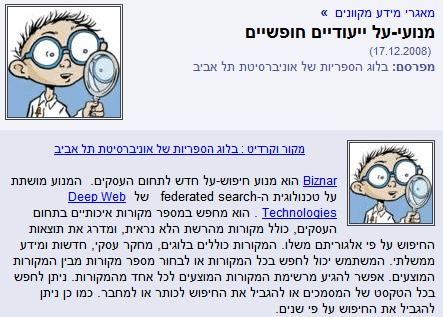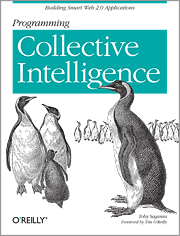30
Jan
 Steven J. Bell is the first runner up in the federated search writing contest. The aim of the contest was to predict the future of federated search. Below is Steven’s bio and his essay, in its entirety.
Steven J. Bell is the first runner up in the federated search writing contest. The aim of the contest was to predict the future of federated search. Below is Steven’s bio and his essay, in its entirety.
Steven J. Bell is Associate University Librarian for Research and Instructional Services at Temple University. Previously he was Director of the Library at Philadelphia University and Assistant Director at Penn’s Wharton School Library, where he also earned his Ed.D. He writes and speaks about academic librarianship, learning technologies and library management. An Adjunct Professor at Drexel University’s College of Information Science and Technology, he teaches the academic librarianship course. His website and blog, “Steven Bell’s Keeping Up Web Site” and “The Kept-Up Academic Librarian” promote current awareness skills and resources. Steven is a co-founder of the Blended Librarian’s Online Learning Community on the Learning Times Network and has participated in numerous virtual presentations. He blogs for ACRLog, ACRL’s official Weblog, and Designing Better Libraries, a blog about design thinking and library user experiences. He is co-author of the book “Academic Librarianship by Design”. For additional information about Steven J. Bell or links to his projects, point your browser to http://stevenbell.info.
Read the rest of this entry »
28
Jan
Mednar and Biznar, vertical search portals created by blog sponsor Deep Web Technologies, have been enjoying some attention in the international blogosphere. In this article I provide a gallery of the references I’ve found to the Deep Web portals and, for your entertainment, I also throw in translations of snippets of the articles, courtesy of Google translation.
Enjoy!
Hebrew
http://www.i-zm.info/data/article.phtml?c_id=2&id=1664

Source credit: Blog Directory of Tel Aviv University
Biznar is a search engine - the new field of business. Engine based on the technology-federated search of Deep Web Technologies. Is looking for a number of high-quality sources of business, including sources from the non-visible, and rank the results according to its own algorithm. Sources include blogs, research, business, government news and information. The user can search all the sources or the number of sources to choose between the original proposed. Can I get the sources from each of the proposed source. You can search the entire text of the documents or to restrict your search to the title or author. Also you can restrict your search based on the years.
Read the rest of this entry »
26
Jan
Medical librarian, the Krafty Librarian, ponders universal search and controlled vocabulary search in a thought-provoking post at her blog. What is “universal search?” The term means different things to different people. Some people equate universal search with federated search. Others think of Google’s combining of mixed media results as universal search. I think the Krafty Librarian is using the term to refer to the kind of searching most non-librarians use where we query using familiar keywords and/or phrases. Google employs this kind of searching as do common federated search engines. To avoid confusion, I’ll use the term “simple searching” instead.
What I particularly enjoyed about the Krafty Librarian article was the comparison between performing a controlled vocabulary search and speaking a foreign language. The disconnect between many librarians and their patrons, as I see it, is that librarians are experts in a number of foreign languages and they expect their users to become experts as well. The users, however, aren’t interested.
Read the rest of this entry »
23
Jan
Lee LeBlanc is the second runner up in the federated search writing contest. The aim of the contest was to predict the future of federated search. Below is Lee’s bio and his essay, in its entirety.
 Lee LeBlanc is Continuing Education and Emerging Technologies Coordinator at SWFLN. Lee’s main interests are “continuous” education, leadership within libraries, and the strategic use of emerging technology in libraries.
Lee LeBlanc is Continuing Education and Emerging Technologies Coordinator at SWFLN. Lee’s main interests are “continuous” education, leadership within libraries, and the strategic use of emerging technology in libraries.
Lee is one semester away from a Masters of Information and Library Science with concentrations in Information Architecture and Technology. Lee’s work career has somehow always revolved around information science. Having a librarian as a mentor after he got out of the military and worked through his undergrad, he developed a deep appreciation for what libraries could do for individuals and their communities.
Read the rest of this entry »
22
Jan
Carmichael does something in her blog that I’d like to see more of — she shares her federated search journey. Over the past year, but especially in recent weeks, Carmichael has written about her experiences exploring federated search. Posts on the subject include:
Read the rest of this entry »
19
Jan
Here are a number of things I’m thinking about, mostly (but not all) for future blog articles.
- PurpleSearch. This is a new federated search engine from the University of Groningen in the Netherlands with some intriguing features, including automated source selection. Here’s an introduction from purpleSearch’s About page:
Purplesearch enables simultaneous search in the most important scientific and scholarly databases. It is an interface that eases and enriches federated search.
It eases this method of searching by not requiring manual selection of the databases to search in. PurpleSearch learns, over time, what each databases contains and will give good results for any given search query. PurpleSearch combines smart search techniques, local indexing, and using that index for each new search. As such, presented results are those from a search in the best scoring databases for a query. It is also possible to do targeted searches within different databases.
Most of us will require a guest account to use the service. I’ve requested one and will report back with my impressions.
Read the rest of this entry »
16
Jan
The six judges, noted federated search experts, have selected Rich Turner, Vice President of Marketing at Content Analyst Company, LLC, as the grand-prize writing contest winner. Mr. Turner receives a $500 award from contest and blog sponsor Deep Web Technologies. Additionally, his essay will be published in the April edition of Information Today’s Computers in Libraries Magazine. And, if that weren’t enough, Mr. Turner will participate in a panel discussion with noted industry experts Frank Cervone and Jeff Wisniewski at the upcoming Computers in Libraries Conference.
Read the rest of this entry »
14
Jan
I’ve written a number of educational articles about federated search for this blog and for other venues but I had always skirted around the issue of explaining what exactly federated search is. Finally, I’ve written a primer for people who are comfortable with search engines but want to understand what federated search is all about.
AltSearchEngines published the primer in three parts: Part I, Part II, Part III.
Read the rest of this entry »
12
Jan
 Web 2.0 is a fascination of mine. I’m very community oriented and I’ve watched the computer industry evolve over the past nearly thirty years. I’m very excited about the potential for people and computers to change the world and to help solve our most pressing problems.
Web 2.0 is a fascination of mine. I’m very community oriented and I’ve watched the computer industry evolve over the past nearly thirty years. I’m very excited about the potential for people and computers to change the world and to help solve our most pressing problems.
Lorcan Dempsey took a look at O’Reilly’s “Programming Collective Intelligence” and he inspired me to look at the book as well. I blogged about Lorcan’s blog article and was able to get a review copy of the book.
Read the rest of this entry »
8
Jan
Thirteen months ago I started the journey of this blog. Yesterday, FUMSI featured an article I wrote about my first year of blogging. FUMSI is an acronym for “Find,” “Use,” “Manage,” “Share,” “Information.” FUMSI is a resource that helps professionals with all aspects of dealing with information. Some of FUMSI’s content is free to the public. Other material, like Jill Hurst-Wahl’s excellent Federated Search Report and Tool Kit, which I reviewed in this blog, are for sale.
On the blog’s birthday, I provided some blog stats. In the FUMSI article, I reminisce. I share myself in a way that I don’t normally do on this blog.
No, I’m not going to write a “making of” article. Read the article. Enjoy it. And, Happy New Year!
 Steven J. Bell is the first runner up in the federated search writing contest. The aim of the contest was to predict the future of federated search. Below is Steven’s bio and his essay, in its entirety.
Steven J. Bell is the first runner up in the federated search writing contest. The aim of the contest was to predict the future of federated search. Below is Steven’s bio and his essay, in its entirety.
 Lee LeBlanc is Continuing Education and Emerging Technologies Coordinator at
Lee LeBlanc is Continuing Education and Emerging Technologies Coordinator at  Web 2.0 is a fascination of mine. I’m very community oriented and I’ve watched the computer industry evolve over the past nearly thirty years. I’m very excited about the potential for people and computers to change the world and to help solve our most pressing problems.
Web 2.0 is a fascination of mine. I’m very community oriented and I’ve watched the computer industry evolve over the past nearly thirty years. I’m very excited about the potential for people and computers to change the world and to help solve our most pressing problems.
